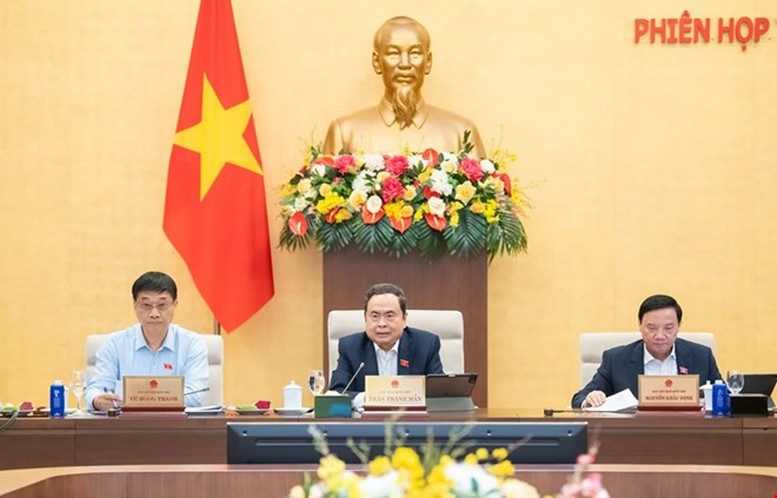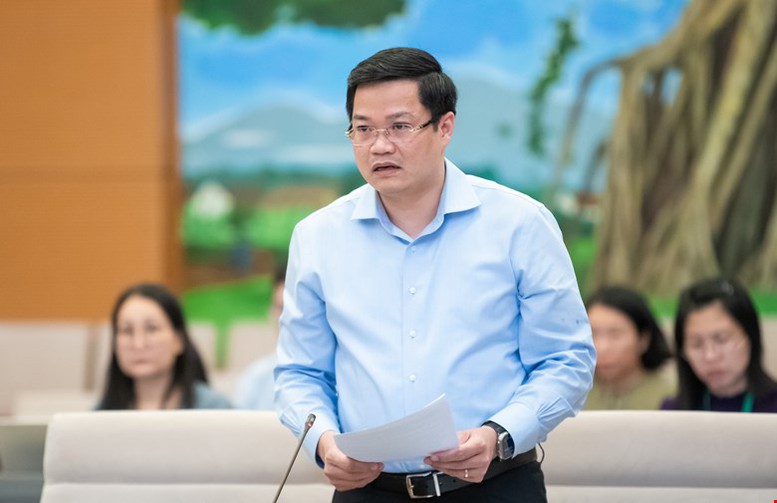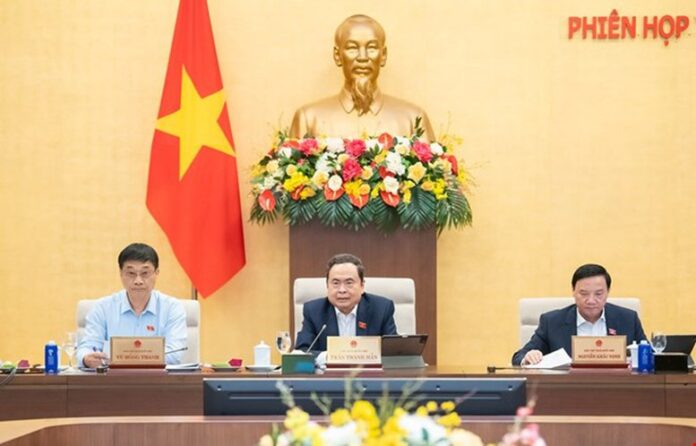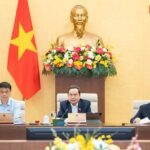
National Assembly Chairman Tran Thanh Man stated that the National Assembly would strive to pass the Resolution on May 17th.
Addressing Bottlenecks in Private Sector Development
During the 45th session of the National Assembly Standing Committee on May 14th, the Standing Committee discussed the draft Resolution of the National Assembly on special mechanisms and policies to promote the development of the private sector.
At the meeting, Deputy Minister of Finance Nguyen Duc Tam presented a summary of the proposal.
The proposal clearly states the need to promptly institutionalize the guidelines, views, mechanisms, and policies outlined in Resolution No. 68-NQ/TW, addressing bottlenecks in private sector development. These mechanisms and policies should be practical, effective, and immediately applicable.
The draft resolution also aims to diversify resource mobilization and release social resources to focus on accelerating the development of socio-economic infrastructure, meeting the requirements for double-digit economic growth in the next phase.
Additionally, the draft outlines principles for inspection, examination, licensing, and certification procedures for businesses, business households, and individuals engaged in business activities, aiming to improve the efficiency of these processes and reduce overlaps.
According to the proposal, inspections and examinations for businesses, business households, and individuals should not exceed once a year, unless there is clear evidence of violations. Stringent actions will be taken against any acts of harassment or causing difficulties for businesses during these processes. Remote inspections and examinations based on electronic data are prioritized, reducing the need for direct interactions.
The draft resolution also proposes exempting well-compliant businesses from on-site inspections and shifting the management of business conditions from licensing and certification to self-declaration and post-inspection, except for a few sectors that require licensing as mandated by international regulations and practices.
Furthermore, the draft clearly differentiates between the responsibilities of legal entities and individuals, as well as between criminal, administrative, and civil liabilities.
In the event of civil and economic violations, civil and economic measures will be prioritized. Businesses, business households, and individuals will be given the opportunity to proactively rectify violations and compensate for damages. If the practical application of the law could lead to criminal prosecution or non-prosecution, the non-prosecution option will be chosen.

Deputy Minister of Finance Nguyen Duc Tam presenting a summary of the proposal
For violations that warrant criminal prosecution, proactive, timely, and comprehensive economic remedies will be prioritized. These remedies will serve as an important basis for investigative agencies to consider when deciding on prosecution, investigation, indictment, trial, and subsequent handling procedures.
The draft resolution also emphasizes that retroactive application of legal provisions to the detriment of businesses, business households, and individuals is not permitted.
In cases where information, documents, and evidence are not sufficiently clear to conclude that there has been a violation of the law, a conclusion should be promptly reached in accordance with procedural laws, and this conclusion should be made public.
Additionally, the principle of presumption of innocence must be ensured throughout the investigation, prosecution, and trial processes.
Keeping to the Timeline for Passing the Resolution
National Assembly Chairman Tran Thanh Man commended the drafting committee for their efforts in completing the draft resolution within just 10 days of the issuance of Resolution No. 68-NQ/TW. He acknowledged the urgency to meet the timeline for passing the resolution by the end of this week.
Chairman Tran Thanh Man affirmed that the National Assembly aims to pass the resolution on Saturday, May 17th. He described the resolution as concise and featuring breakthroughs in private sector development.
Additionally, when amending a series of laws in the future, relevant contents related to the private sector will be modified and supplemented in laws pertaining to criminal, civil, administrative, inspection, tax, science, and technology matters.
To ensure the draft resolution’s readiness before submitting it to the National Assembly, Chairman Tran Thanh Man advised relevant agencies to review the contents related to supporting science and technology, innovation, and digital transformation. He also emphasized the importance of improving the business investment environment and ensuring equality between domestic and foreign private enterprises.
Regarding international agreements and commitments, the Chairman advised a careful review to avoid conflicts with previous international treaties and laws. He stressed the need to shift the mindset from state control to state facilitation and service, urging a change in the administrative mindset to one of creation and service.
Moreover, Chairman Tran Thanh Man highlighted the significance of ensuring financial resources to implement the proposed policies. He noted that policies such as infrastructure investment support, land rent exemption for high-tech enterprises and small and medium-sized enterprises, credit support for startup and innovative enterprises, and tax exemption policies require substantial financial resources for their realization. He also suggested reviewing the policy beneficiaries to ensure feasibility in practice.
Le Quang Huy, Chairman of the Committee for Science, Technology, and Environment, suggested prioritizing the immediate handling of a select number of issues, rather than attempting to address everything in a single resolution. He also recommended establishing a monitoring mechanism to mitigate risks and ensure harmony and balance.
In response, Deputy Prime Minister Nguyen Chi Dung acknowledged the challenge in selecting which contents to include in the resolution. Regarding provisions related to criminal, civil, and inspection matters, he shared that the business community eagerly anticipates these significant policies. Excluding them, he argued, would diminish the resolution’s impact. While these provisions may not be immediately actionable, they convey the National Assembly’s message and provide direction for subsequent law amendments, according to the Deputy Prime Minister.
Concluding the session, Vice Chairman of the National Assembly Vu Hong Thanh expressed the Standing Committee’s appreciation for the collaboration between the Economic and Financial Committees and the Ministry of Finance. He commended their proactive efforts in finalizing the draft. The Standing Committee concluded that the draft resolution is ready to be submitted to the National Assembly for consideration on May 15th.
Before presenting the draft to the National Assembly, Vice Chairman Vu Hong Thanh requested that the drafting committee incorporate the contributions made during the session and finalize the draft by tonight. He asked that the updated draft be distributed to National Assembly delegates through the National Assembly’s information app tonight.
“Empowering Family Businesses: The Backbone of the Private Sector”
Establishing a robust knowledge base and network, empowering family-run businesses to thrive sustainably, professionally, and across generations.
Unleashing Economic Growth: Presenting Five Key Policies to Empower the Private Sector
The draft resolution of the National Assembly on mechanisms and policies to develop the private sector proposes a number of specific and unique mechanisms and policies. This is a timely initiative to institutionalize the Politburo’s direction in Resolution No. 68-NQ/TW, creating a “springboard” to unleash the latent resources and productive capacity of the private sector, thereby fostering a new impetus for economic growth.
Unlocking Vietnam’s Economic Potential: The Visionary Insights of General Secretary To Lam
“A New Impetus for Economic Development”: This article by General Secretary To Lam, published across news outlets on May 11, 2025, marks a significant turning point in Vietnam’s economic thinking and practice for the new era.





















